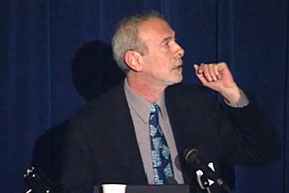Disadvantaged Diversity
Gender bias and professional discrimination in the academy

Click here to watch Robert Drago on BUniverse.
In 1999, the Massachusetts Institute of Technology issued a reportthat female faculty in science and engineering were systematicallydisadvantaged in terms of resources and career opportunities. Thereport sparked a national debate about gender bias and professionaldiscrimination in the academy. Eventually, says Robert Drago,a professor of labor studies and women’s studies at Penn StateUniversity, “people figured out that family might have something to dowith why women weren’t advancing in science and engineering as fast aswe would like.”
Speaking during the daylong conference The Research Life: Work/Family Issues for Scientists and Engineers, sponsored by Women in Science and Engineering (WISE) at BU,Drago begins by saying, “I’ve given this talk 36 times, and I stronglysuspect that I’ll give it another 36 times. And that sounds like badnews, like we’re just battering our heads against a wall. It’s not.It’s good news. It’s because there’s a lot of change going on.” Hediscusses research he’s done indicating that female faculty are muchmore likely than their male counterparts to avoid or delay havingchildren in order not to jeopardize their careers. According to Drago,the workplace has been governed by a “bias against care giving” that isfed by two norms — the motherhood norm (that women should do themajority of household labor) and the ideal worker norm (the assumptionthat true professionals are totally committed to their careers foryears and decades at a stretch). He argues against the idea that theacademic workplace is any more family-friendly than other prestigiouscareers, citing a study showing that women in academia are less likelyto have children than are female lawyers and doctors.
WISE is anetwork of women faculty in science and engineering disciplines atBoston University. The organization’s goal is to foster a supportiveresearch environment for women and men and provide opportunities forcareer development, mentoring of students, and leadership training.
November 8, 2007, 11 a.m.
George Sherman Union
About the Speaker:
RobertDrago is a professor of labor studies and women’s studies at Penn StateUniversity and an expert in work-life balance issues. Much of hisrecent research has focused on how these issues play out amonguniversity faculty, where, according to Drago, if you’re a femaleacademic and “you take [your] care-giving commitments seriously, thenyou won’t be taken seriously.”
In his 2007 book, Striking a Balance,Drago offers a scholarly examination of three intertwined gaps inAmerican society — the care gap (too many children, elderly, anddisabled not getting the care they need), the gender gap (women beingforced to choose between careers and family), and the widening incomegap between rich and poor.
In the book he prescribessociety-wide remedies to these growing problems, including paid familyleave, early childhood education and child-care financing, guaranteedhealth insurance, and a minimum wage increase indexed to inflation.
Comments & Discussion
Boston University moderates comments to facilitate an informed, substantive, civil conversation. Abusive, profane, self-promotional, misleading, incoherent or off-topic comments will be rejected. Moderators are staffed during regular business hours (EST) and can only accept comments written in English. Statistics or facts must include a citation or a link to the citation.